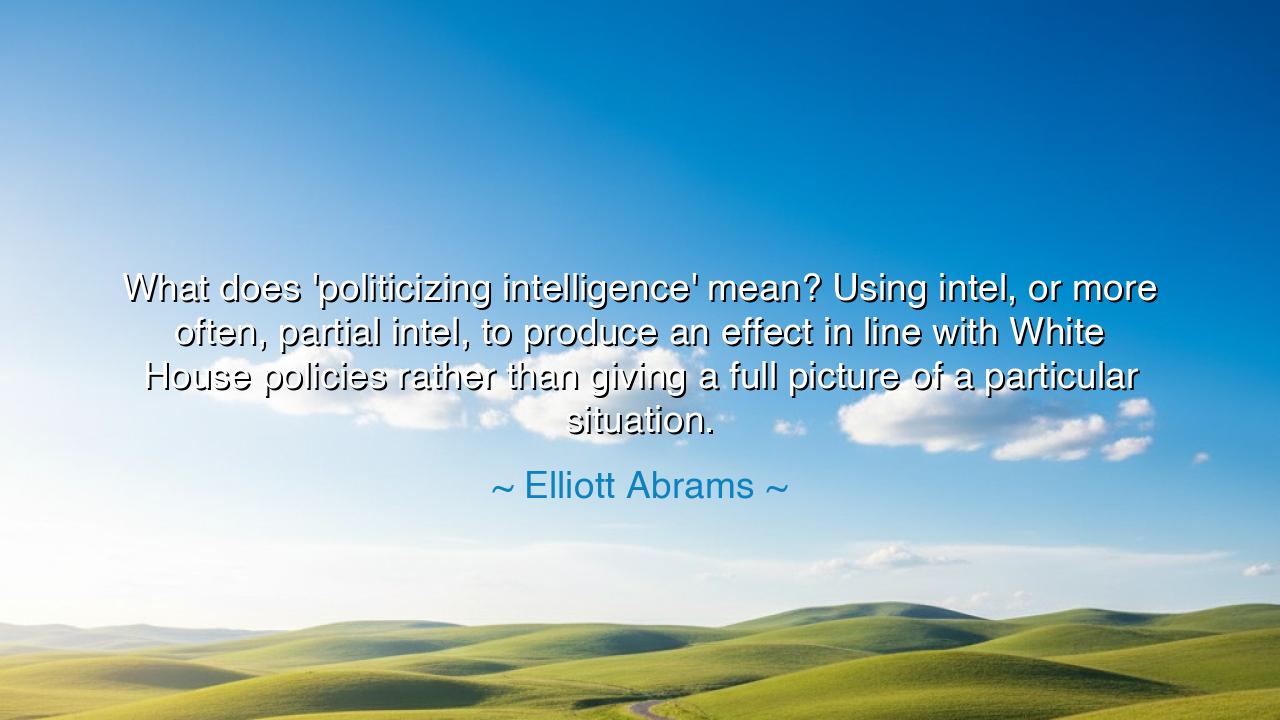
What does 'politicizing intelligence' mean? Using intel, or more
What does 'politicizing intelligence' mean? Using intel, or more often, partial intel, to produce an effect in line with White House policies rather than giving a full picture of a particular situation.






“What does ‘politicizing intelligence’ mean? Using intel, or more often, partial intel, to produce an effect in line with White House policies rather than giving a full picture of a particular situation.” – Elliott Abrams
Listen, O seeker of truth, and weigh carefully the warning in these words of Elliott Abrams, a statesman who has witnessed the shifting tides of power and the peril that comes when truth is bent to serve ambition. In this age-old struggle between knowledge and power, he speaks of the sin of politicizing intelligence—the act of twisting truth to suit the will of rulers, of shaping partial knowledge into a weapon of persuasion, rather than presenting the full picture that wisdom demands. This corruption of understanding is not new; it is as old as kings and councils, as old as the first lie whispered in the ear of a sovereign.
To politicize intelligence is to betray the sacred trust between those who know and those who decide. For intelligence—the knowledge drawn from observation, study, and inquiry—is meant to illuminate, to guide the nation safely through the fog of uncertainty. But when men in power hunger not for truth but for validation, they demand that knowledge kneel before policy. Then truth becomes a servant, not a master, and nations are led not by wisdom but by illusion. Abrams warns that this is not the use of intelligence, but its corruption. For the wise do not shape reality to their liking—they listen to it, however harsh its voice.
History is filled with the ruins of those who ignored this counsel. Consider the story of Troy, that ancient city brought to ruin not merely by strength of arms, but by deceit and blindness. When Cassandra, gifted with prophecy, warned her people of the Greeks’ trickery, her words were dismissed, for they did not fit the desires of her rulers. The partial truth—the appearance of peace—was more comforting than the full reality of danger. And so, they opened their gates to the wooden horse, mistaking doom for deliverance. So it is with nations that politicize intelligence: they see what they wish to see, and perish by what they refused to know.
So too in modern times, when governments have fallen to the same temptation. There have been wars justified by selective truths, conflicts waged on the strength of half-seen facts, and policies born of partial intelligence rather than the whole. The cost of such blindness is measured not only in treasure, but in human lives. Abrams, having seen the machinery of power from within, reminds us that truth cannot be divided without consequence. The moment it is shaped to please the throne, it ceases to be truth and becomes propaganda—a shadow that mimics light but leads only deeper into darkness.
And yet, his words are not merely accusation—they are a call to integrity. For there are still those who stand as guardians of truth, those who speak even when it is dangerous, those who refuse to twist knowledge into deception. In every age, the philosopher, the scientist, the honest advisor must hold fast against the pressure of politics. They must remember that their duty is not to please, but to reveal; not to flatter power, but to serve truth. For only by truth can nations stand; deceit, no matter how clever, is a foundation of sand.
The wise of old—Plato, Cicero, Confucius—all warned that when truth and governance part ways, destruction soon follows. A ruler who blinds himself with false counsel will lead his people into shadow. A nation that hides its own realities will one day be struck by them. The full picture, though complex and sometimes grim, is the only guide worthy of trust. To face it is to act with courage; to conceal it is to act in fear.
So, my child of the present age, take this lesson into your heart: never shape truth to fit your desire—shape your desire to fit truth. Whether in the halls of government or the quiet corners of your own life, let honesty guide your decisions. Speak the whole, not the half, and seek the light even when it exposes fault. For the one who hides the truth to gain favor may win the moment, but will lose eternity.
Thus, as Elliott Abrams reminds us, beware of the false comfort of partial knowledge. Seek always the full picture, and let truth, however inconvenient, be your compass. For nations, like men, do not perish for lack of might—they perish for lack of truth.






AAdministratorAdministrator
Welcome, honored guests. Please leave a comment, we will respond soon